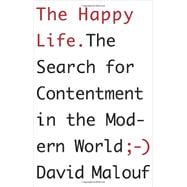
What is included with this book?
David Malouf is the author of eleven novels, as well as bountiful collections of stories, poetry and opera libretti. He has won the International IMPAC Dublin Literary Award, the Commonwealth Writers’ Prize, the Los Angeles Times Book Award, the Prix Femina Étranger and the Australia-Asia Literary Award; he has also been short-listed for the Man Booker Prize. He lives in Australia.
The New copy of this book will include any supplemental materials advertised. Please check the title of the book to determine if it should include any access cards, study guides, lab manuals, CDs, etc.
The Used, Rental and eBook copies of this book are not guaranteed to include any supplemental materials. Typically, only the book itself is included. This is true even if the title states it includes any access cards, study guides, lab manuals, CDs, etc.
The Character of a Happy Life
Happiness surely is among the simplest of human emotions and the most spontaneous. There can be no one, however miserable the conditions of their daily existence, who has not at some time felt the joy of being alive in the moment; in the love of another, or the closeness of friends or fellow workers; in a baby’s smile, the satisfaction of a job well done or the first green in a winter furrow; or more simply still, bird-song or the touch of sunlight. But for the vast majority of men and women who have shared our planet in the long course of human history, these can have been no more than moments in a life that was unremittingly harsh.
Think of a medieval farmer as he struggled to keep body and soul together, at the mercy of famine, plague and the periodic arrival over the horizon of mercenaries in search of food or plunder; or women and children in the eighteenth century who spent fifteen hours a day hauling a truck loaded with coal out of a pit; or the African slaves who endured the Middle Passage to the Americas. Think of the millions, soldiers and civilians both, caught up in the wars and social upheavals of the last century, the invasions, evacuations, forced resettlements, the daily struggle to survive the horrors of Auschwitz-Birkenau or Belsen or Mauthausen.
We get some idea of what “happy” might mean to an inmate of the Soviet Gulags from the list of small mercies at the end of Alexander Solzhenitsyn’sOne Day in the Life of Ivan Denisovich:
Shukhov went off to sleep, and he was completely content. Fate had been kind to him in many ways that day: he hadn’t been put in the cells, the gang had not been sent to the Socialist Community Centre, he’d fiddled himself an extra bowl of porridge for dinner, the gang-leader had fixed a good percentage, he’d been happy building that wall, he’d slipped through the search with that bit of blade, he’d earned himself something from Tsesar in the evening, he’d bought his tobacco. And he hadn’t fallen ill—had overcome his feelings of illness in the morning.
The day had gone by without a single cloud—almost a happy day.
There were three thousand six hundred and fifty-three days like that in his sentence, from reveille to lights out.
The three extra days were because of the leap years . . .
The truth is that for most of our history only the few, who had the privilege of living free of long hours of hard labour and vulnerability to privation and every form of accident, enjoyed the luxury of considering what happiness of a more settled kind might be: the freedom to cultivate, outside the turmoil of daily living, their “garden.” Either a real one of orchards and shady walks—Horace’s Sabine farm or Voltaire’s Ferney—or the metaphorical one of Marvell’s “green thought in a green shade.” Or, within a life that is still engaged with contingency and dailyness, what Montaigne calls “the little back-shop, all our own, entirely free,” that we must set aside for our self-preservation in even the most crowded household. “In this retreat,” he tells us,
we should keep up our ordinary converse with ourselves, and so private, that no acquaintance or outside communication may find a place there; there to talk and laugh, as if we had neither wife, nor children, nor worldly goods, retinue or servants; to the end that, should we happen to lose them, it may be no new thing to do without them . . . Since God gives us permission to arrange for our own removal, let us prepare for it; let us pack up our belongings, take leave betimes of the company, and shake off those violent holdfasts that engage us elsewhere and estrange us from ourselves. We must undo those powerful bonds, and from this day forth we may love this and that, but be wedded only to ourselves. That is to say, let the rest be ours, but not joined and glued so firmly to us that it cannot be detached without taking our skin along with it, and tearing away a piece of us. The greatest thing in the world is to know how to belong to yourself.
Montaigne knows only too well, of course, that one needs more than “God’s permission” to achieve this. It helps if one is also the Seigneur de Montaigne,Chevalier de l’ordre du Roy et Gentilhomme ordinaire de sa chambre, mayor and governor of Bordeaux, a child of fortune and high privilege; though even then one will be as vulnerable as any other to the ills of the body, and to the hesitations, doubts, irrational hauntings, moods, fears that trouble our fragile consciousness; and of course no one, however protected by royal favour and titles, is safe from Death.